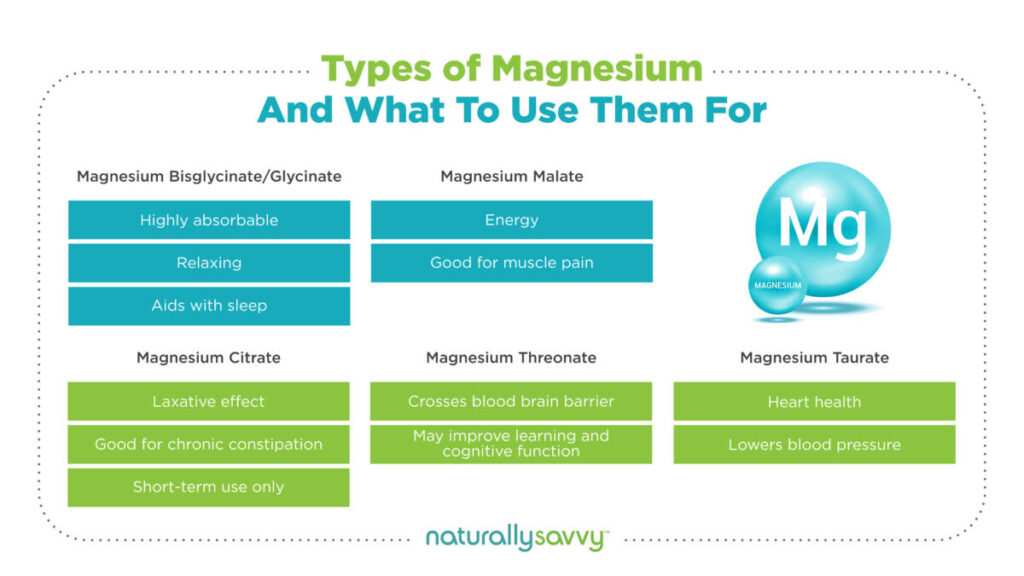
We hear a lot about magnesium and for good reason. This mineral is involved in hundreds of bodily processes, from head to toes. But not all magnesium is alike. In fact, there are about a dozen different types, so you need to know which one(s) fit your specific needs. Let’s take a look at the types of magnesium available to you and your family.
What is magnesium?
Magnesium is an element that plays a part in more than 300 enzyme reactions in your body, ranging from nerve function to regulating blood pressure and facilitating the immune system's work. About half of the estimated 25 grams of magnesium in the adult body is found in the skeleton, while the rest resides in bodily fluids, soft tissues, and muscle.
Which type of magnesium should I use?
Magnesium chloride
This form is the marriage of magnesium and chlorine, which makes it a magnesium salt. Magnesium chloride supplements in the form of tablets and capsules can be used to raise magnesium levels as well as manage constipation and heartburn. You can also find lotions and ointments that contain magnesium chloride, which may help relieve sore muscles.
Magnesium citrate
This form of magnesium is bound with citric acid, a substance that is present naturally in citrus fruits. If you are looking for a magnesium supplement that is more easily absorbed by the body than other forms (that is, it’s very bioavailable) and can help lift low magnesium levels, then magnesium citrate is a good choice.
Aside from its nutritional value, magnesium citrate is sometimes used as a laxative for constipation, as well as a natural remedy for anxiety and depression.
Read about do you need a magnesium supplement?
Magnesium glycinate
The amino acid glycine, which is used to build proteins in the body, is combined with magnesium in this supplement. Some people use glycine as a solo supplement to address problems with sleep, heart disease, and inflammatory conditions. Magnesium glycinate may help with depression, insomnia, stress, and anxiety, although more research is needed.
Read about can magnesium regulate blood pressure
Magnesium lactate
Lactic acid is the companion of magnesium in this form of the mineral. You may be familiar with lactic acid as the substance that your muscles and blood cells produce. However, you may also see it listed as a food additive in some beverages and foods. Magnesium lactate is easily absorbed and is gentle on the digestive tract.

Magnesium malate
The “secret” ingredient in this form of magnesium is malic acid, which is found naturally in some fruits and wine. It is well absorbed, which makes it a good candidate to replenish magnesium levels. It’s also gentle on the digestive tract and its laxative effect is less than other types of magnesium.
Some research has been conducted to determine whether magnesium malate is helpful for managing fibromyalgia. Although this supplement is sometimes suggested, the evidence doesn’t back up its use as of yet.
Magnesium orotate
This easily absorbed form of magnesium is believed to have some heart health benefits. That’s due to the presence of orotic acid, which is involved in energy production for the heart and blood vessels. These qualities make magnesium orotate of interest to athletes and people who have heart disease or who are concerned about heart health. However, it also is more costly than other forms of magnesium.
Magnesium oxide
You may recognize this form of magnesium as milk of magnesia. It’s a combination of magnesium and oxygen and is typically available as a liquid, powder, or capsule form. Some research suggests it may also help prevent and treat migraines.
Magnesium sulfate
You may know this form of magnesium better as Epsom salt. This combination of magnesium, oxygen, and sulfur is often ingested to treat constipation. The white coarse powder also can be dissolved in water as a bathtub soak to help ease sore muscles.
Magnesium taurate
The amino acid taurine combines with magnesium in this supplement. It appears magnesium taurate may help regulate blood sugar levels as well as support healthy blood pressure. These potential benefits suggest magnesium taurate may support heart health.
Magnesium l-threonate
If you want to boost the levels of magnesium in your brain, and possibly help with brain disorders, then this supplement may be for you. Magnesium l-threonate combines the mineral with threonic acid, a substance derived from vitamin C when it is broken down. The potential brain benefits of magnesium l-threonate may include helping with age-related memory loss and depression by boosting magnesium concentrations in brain cells, although much more research is needed.
Bottom line
The daily recommended amount of magnesium for women is 320 mg and for men, 420 mg. Magnesium is best obtained from foods, such as dark leafy greens, nuts, seeds, legumes, whole grains, wheat germ, and avocados. Your choice of magnesium supplement will depend on your unique needs. When you take magnesium is up to you however if you are looking for help relaxing and with sleep taking it before bedtime is ideal. You may want to consult with a knowledgeable healthcare provider before choosing a magnesium supplement.










